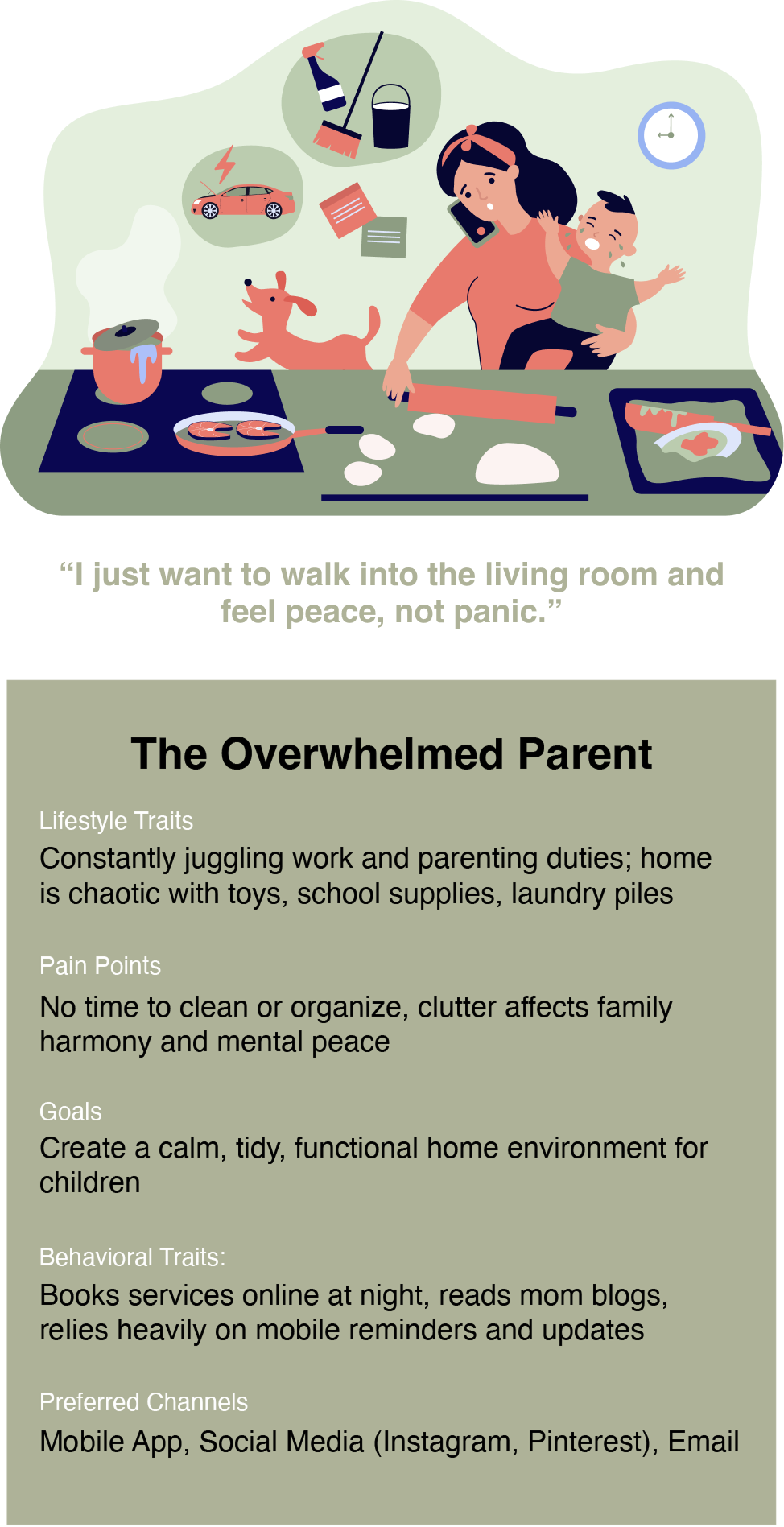
TIDY INN
Behavioral design intervention
WINNER: INDIGO DESIGN AWARDS | 2025
Gold Winner in Branding for Interior
Gold Winner in Education for Social Change
Silver Winner in Interaction Design for Social Change
Silver Winner in Websites Design for Social Change
Silver Winner in Branding for Home & Garden
Bronze Winner in UX, Interface & Navigation
Bronze Winner in Branding for Retailer
Bronze Winner in Branding for Services - Other
User Experience Researcher
Service Designer
Role
Duration
7 Weeks
Miro
Figma
Adobe After Effects
Skills
Strategic Thinking
Framework Development
Tools
Akshatha palyam
Roxana Gonzalez
Ming Huang
Pranali Mukkannavar
Team
The Project Outcomes
This journey map captures how users discover, book, and experience our service, every step designed to bring ease, order, and peace of mind..
From Clutter to Clarity
Key Digital Interventions
Tidy Cost Calculator
The Tidy store calculator-not a regular calculator but works on improved image detection of a space and amount of work to be done.The Tidy Calculator uses advanced image detection technology powered by AI to assess spaces and estimate service costs accurately. It is unique because of its precision and transparency, allowing users to visualize the scope of work and make informed decisions before committing to the service. This innovative feature simplifies the organizing process, ensuring convenience and cost-efficiency while enhancing customer trust.
Tidy Store
The Tidy Store is more than a typical organizer shop. It offers a wide range of products tailored for every space—desks, kitchens, bedrooms, and more. Its unique selling point is the "Sell and Donate" section, enabling users to resell or donate valuable old items, promoting a circular product lifecycle. Additionally, the store features a gifting section with quality products, making it a sustainable and impactful choice for home organization needs.
Decluttering Done Right
Discover how the service can transform the way we declutter, organize, and live better.

“For every minute spent in organizing,
an hour is earned”
This project focused on a user-centered service design approach, integrating research and practical implementation to develop Tidy-Inn, a service aimed at decluttering and optimizing home organization. By gathering and analyzing user insights, the project aimed to streamline organization solutions, blending emotional well-being with functional efficiency.
The outcome was a service ecosystem featuring an interactive Tidy Store for sustainable product exchanges and a Tidy Calculator that leverages AI to estimate organizational needs accurately.
ABOUT PROJECT
-
Researched user pain points, mapped stakeholders, and structured insights using service design methods. Led Tidy Store's UX, refining navigation and building the "Sell and Donate" feature for circular consumption.
Designed the Tidy Calculator, using AI-driven image detection for transparent cost estimates. Created wireframes, service blueprints, and smooth UX flows for a seamless experience. Developed the project video in After Effects and contributed to presentation decks, effectively communicating the concept and process.
-
Understanding the role of behavioral psychology in habit formation helped shape the long-term usability of Tidy-Inn. It reinforced the importance of balancing functionality with emotional engagement, ensuring that organizational solutions were both effective and personally meaningful for users.
-
To ensure feasibility and effectiveness, the team prioritized key insights over broad exploratory ideas. This helped in narrowing down core features that had the highest impact. Some elements were simplified to maintain practical execution without compromising the service’s overall purpose and usability.
-
Ensuring a balance between emotional connection and functional efficiency in service features demanded continuous refinement. Coordinating workshops and aligning diverse team ideas required strong collaboration but ultimately strengthened the project’s outcome.
-
Introducing a community-driven engagement model, such as a rewards system for sustainable participation, would enhance user retention. Exploring B2B partnerships with real estate agencies, home organizers, and sustainable brands could expand reach and establish long-term service viability. Strengthening prototyping skills and integrating sustainability and accessibility would elevate future projects.
Now, let’s see how we got there…
Research Data
What we wanted to know about the target customers?
Stakeholder Map
Ecosystem Map
Current State
Target Customer Archetypes
Customer Journey Map
Current State
Conversational Prototype

Introducing…
This new service aims to efficiently and effectively declutter and organize spaces to meet clients' needs, reduce stress, optimize functionality, provide long-term solutions, and uphold professionalism while promoting sustainability and empowering clients with personalized strategies.
Multi-touchpoint interaction
Future State
Channel Mix
Human Touch Is Essential: Despite digital touchpoints, the human agent remains the cornerstone of this service. Whether it’s organizing a space or handling post-service feedback, human agents ensure empathy and trust.
Visual Channels Drive Engagement: Platforms like social media and the website are ideal for showcasing transformation (before/after photos), which can greatly influence new users.
Mobile App Enhances Convenience: With booking, purchasing, and NPS collection built in, the app is a central hub for user experience, especially for repeat customers.
Performance Metrics Guide Improvements: Channels are measurable—by tracking KPIs such as CSAT, referral rate, and dwell time, the business can refine offerings and target high-performing platforms.
Omnichannel Flow Enables Retention: Seamless interaction across email, calls, app, and on-site ensures continuity and reduces drop-offs during service transitions.
Touchpint Mix
Digital Front-End, Physical Back-End
The journey begins digitally (web, app, social media) and transitions into a physical experience (on-site service). This hybrid model ensures a smooth hand-off between planning and execution.Social Media & Email Reinforce Loyalty
Both channels play an important post-service role. Social media amplifies word-of-mouth, while email keeps the customer loop active through offers, reminders, and satisfaction checks.Comprehensive App Functionality is Key
The mobile app must handle booking, updates, service tracking, and follow-up efficiently, acting as a one-stop digital concierge.
Customer Journey Map
Future State
Ecosystem Map
Future State
Provide customized post-declutter maintenance kits tailored to each client's needs. The kit could include organizers, cleaning supplies, and digital or printed guides on how to maintain a clutter-free space over time.
Creating Sustainable Ecosystem
A seamless "declutter-to-donate" workflow where clients can track where their items are being recycled, repurposed, or donated. Offering sustainability badges or impact reports showing how much waste was diverted from landfills could be a unique feature.
Long term Membership
A subscription-based model that includes periodic check-ins and mini-sessions for clients who need ongoing assistance. The service could include digital reminders for decluttering tasks and personalized coaching.
Specialized “Pre-Move” or “Downsizing” packages that assist in sorting, packing, and labeling items. This can be paired with moving services or relocation companies, providing a seamless transition from decluttering to moving.
Partner with counselors or coaches trained in decluttering psychology. Offer emotional support sessions as part of the package for clients dealing with sentimentally charged items. Virtual therapy sessions could be offered alongside decluttering for a holistic experience.
A gamified experience where clients are rewarded for completing decluttering milestones. The service could include competitive challenges (solo or group) with rewards like discounted services, charitable donations in the client’s name, or points that accumulate for larger prizes.
Wireframes and Prototypes


















